Home » Posts tagged 'Norbert Noll'
Tag Archives: Norbert Noll
Commemorating Jura Soyfer
Last month marked the 75th anniversary of the death of the young Austrian cabaret writer, Jura Soyfer, in Buchenwald in February 1939. This is the first of a short series of blog posts aiming to show how actors at the Austrian exile theatre in London, the Laterndl, devastated by the news of Soyfer’s death, commemorated Soyfer with performances of his songs and plays. The posts will also highlight the importance of the collection for holding early records of Soyfer’s work.
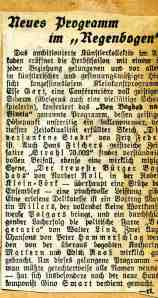
Miller 6/1/1. Newspaper review of the cabaret production, Von Bagdad nach Vineta, at Vienna’s ABC cabaret theatre, autumn 1937 (original source unknown)
A number of the leading actors in the exile theatres, including Martin Miller, Rudolf Spitz, Jaro Klüger and Peter Preses, had worked with Soyfer in Vienna in the 1930s during the period of Austrofascist rule before the German annexation of March 1938. Soyfer had been the main writer behind the cabaret production at Vienna’s ABC Regenbogen Café, Von Bagdad nach Vineta (From Baghdad to Vineta) (reviewed in the above newspaper article), in which Martin Miller had performed (for more information see a previous post). The names ‘Fritz Feder’ and ‘Norbert Noll’ used in the article were in fact Soyfer’s pseudonyms.
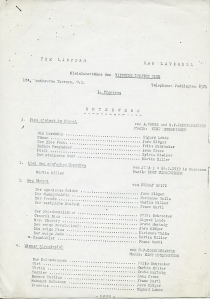
Miller 5/1/2. Programme (copy) for the Laterndl’s first show, Unterwegs
The Laterndl’s dedication to performing Soyfer’s work began with their first cabaret production, a programme for which is shown above. Unterwegs played from June until August 1939 under Martin Miller’s direction at the Austrian Centre near Paddington. Alongside the items by exile writers like Hugo F. Königsgarten and Rudolf Spitz, the programme lists Soyfer’s ‘Lied des einfachen Menschen’ (literally, ‘Song of the simple people’), sung by Martin Miller with Kurt Manschinger on the piano.

Miller 1/2/41/4. Script of ‘Lied des einfachen Menschen’ by Jura Soyfer
With his ‘Lied des einfachen Menschen’ Soyfer lamented the degrading and dehumanising effects of unemployment, which was rife in 1930s Austria. It is the only text to have survived from his play Pinguine. Ein Polarnachsttraum (Penguins. A polar night’s dream), first staged in Vienna in 1936, again with Martin Miller in the cast.1 The following recollection by Franz Bönsch, one of the Laterndl’s founding members, describes the effect of the performance on of the song on the exile audience:
In the Laterndl people cried together and laughed together. Unforgettable were the sobs which emanated from the audience […] when Jura Soyfer’s song was heard. ‘We are the name on the passport, we are the echo of what once was finely said, the rumour of a rumour that’s long dead’ – and there was something like a deep exhalation of breath as the song continued: ‘A poor, half-finished sketch is all we are, a glimpse of humans in their final state. A tune suggested by the opening bar. Your call us wretches human beings? Wait!’ 2
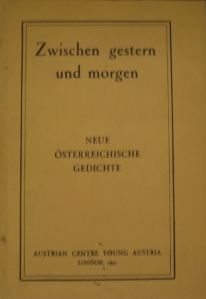
Front cover of Young Austria’s Zwischen Gestern und Morgen (London: Austrian Centre, 1942)
‘Ein einfacher Mann spricht’ (‘A simple man speaks’) was published by the Austrian exile group, Young Austria, in Zwischen Gestern und Morgen in 1942. It was just one of five poems by Sofyer published by the group, an indication of Soyfer’s significance for the exiled Austrian youth groups in London. It was also translated into English by John Lehmann, who had spent time with Soyfer in Vienna in the 1930s, and who later published the translation with the title ‘Song of the Twentieth-Century Man’ in his Collected Poems 1930-1963 (London: Eyre & Spottiswoode, 1963).
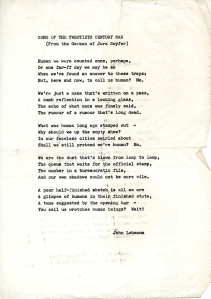
Miller 1/2/4/1/4. English translation by John Lehmann of Sofyer’s ‘Lied des einfachen Menschen’
The Laterndl opened in its new home at 153 Finchley Road at the beginning of January 1940. The company then dedicated four full evenings (15, 22, 29 January and 5 February) to staging Soyfer’s work, marking the passing of nearly a year since Soyfer’s death on 16 February 1939. Again production and direction was led by Martin Miller. Two of the plays performed on these evenings were the two central pieces staged in Vienna in autumn 1937 mentioned in the review above: Vineta, die versunkene Stadt (Vineta, the sunken city) and Der treueste Bürger Bagdads: Ein orientalisches Märchen (The most faithful citizen of Baghdad: an oriental fable). The script of the latter (below), a short, one-act play which was bitingly satirical about the antisemitism of the Austrian authorities, a point which the Viennese newspaper reviews had all ignored.3 A third play staged as part of this tribute to Soyfer, Der Lechner Edi schaut ins Paradies, will be the focus of my next post.

Miller 1/2/4/3/2. Typescript of Soyfer’s Der treuste Bürger Bagdads
The reaction of the exile audience members to the production is illustrated by the letter below written to Martin Miller from another exile writer one day after the first performance. Fritz Gross wrote that ‘the Jura celebration was a great experience. May I present to you and the friends who contributed to the success of this unforgettable evening the enclosed poem as an expression of my deepest thanks’. Enclosed with the letter was a poem of nine stanzas, inscribed ‘Für Martin Miller. 16.1.40. Fritz Gross’.
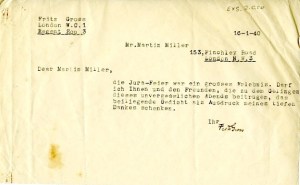
EXS.2.GRO.2. Letter from Fritz Gross to Martin Miller concerning the commemoration of Jura Soyfer, 16 January 1940
Finally, I showed an extract from the speech below, ‘Jura Soyfer: eine Würdigung’ (‘Jura Soyfer: an appreciation’) in a previous post. I did not know at the time who wrote it or when it was given, but I have since discovered that it was written and presented by another Laterndl writer, Albert Fuchs, on the first anniversary of Jura Soyfer’s death.4 The speech has been described as the first attempt to set out Soyfer’s wider significance as a political writer rather than solely as a writer of cabaret sketches.5 As the most gifted Austrian writer of his generation and a great literary hope for the future, Soyfer would, according to Fuchs, have become the Austrian socialist poet.

Miller 1/2/1/6. Typescript of ‘Jura Soyfer: eine Würdigung’ by Albert Fuchs, 1940
Footnotes
1 This is not to say that this is the only copy of the song. For information about further copies please contact the Jura Soyfer Archive.
2 Franz Bönsch, ‘Das österreichische Exiltheater ‘Laterndl’ in London’, in Österreicher im Exil 1934 bis 1945: Protokoll des Internationalen Symposiums zur Erforschung des österreichischen Exils von 1934 bis 1945, ed. by Helene Maimann and Heinz Linzer (Vienna: Österreichischer Bundesverlag, 1977), pp. 440-450 (p. 447.
3 Horst Jarka, Jura Soyfer: Leben, Werk, Zeit (Vienna: Löcker Verlag, 1987), p. 343. The quotation from Soyfer’s song is the translation by John Lehmann mentioned later in the post.
4 Another typescript of the speech is in the Dokumentationsarchiv des österreichischen Widerstandes in Vienna.
5 Jarka, p. 502.
